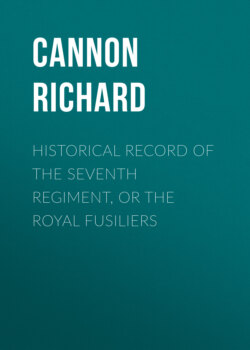Читать книгу Historical record of the Seventh Regiment, or the Royal Fusiliers - Cannon Richard - Страница 5
FOOTNOTES:
Оглавление[1] A company of 200 men would appear thus:—
| 20 | 20 | 20 | 30 | 20 | 30 | 20 | 20 | 20 | |
| Harquebuses. | Muskets. | Halberds. | Muskets. | Harquebuses. | |||||
| Archers. | Pikes. | Pikes. | Archers. |
The musket carried a ball which weighed 1/10 of a pound; and the harquebus a ball which weighed 1/25 of a pound.
[2] The 30th, 31st, and 32nd Regiments were formed as Marine corps in 1702, and were employed as such during the wars in the reign of Queen Anne. The Marine corps were embarked in the Fleet under Admiral Sir George Rooke, and were at the taking of Gibraltar, and in its subsequent defence in 1704; they were afterwards employed at the siege of Barcelona in 1705.
[3] The brave Sir Roger Williams, in his Discourse on War, printed in 1590, observes:—"I persuade myself ten thousand of our nation would beat thirty thousand of theirs (the Spaniards) out of the field, let them be chosen where they list." Yet at this time the Spanish infantry was allowed to be the best disciplined in Europe. For instances of valour displayed by the British Infantry during the Seventy Years' War, see the Historical Record of the Third Foot or Buffs.
[4] Vide the Historical Record of the First, or Royal Regiment of Foot.
[5] "Under the blessing of Divine Providence, His Majesty ascribes the successes which have attended the exertions of his troops in Egypt to that determined bravery which is inherent in Britons; but His Majesty desires it may be most solemnly and forcibly impressed on the consideration of every part of the army, that it has been a strict observance of order, discipline, and military system, which has given the full energy to the native valour of the troops, and has enabled them proudly to assert the superiority of the national military character, in situations uncommonly arduous, and under circumstances of peculiar difficulty."—General Orders in 1801.
In the General Orders issued by Lieut.-General Sir John Hope (afterwards Lord Hopetoun), congratulating the army upon the successful result of the Battle of Corunna, on the 16th of January, 1809, it is stated:—"On no occasion has the undaunted valour of British troops ever been more manifest. At the termination of a severe and harassing march, rendered necessary by the superiority which the enemy had acquired, and which had materially impaired the efficiency of the troops, many disadvantages were to be encountered. These have all been surmounted by the conduct of the troops themselves; and the enemy has been taught, that whatever advantages of position or of numbers he may possess, there is inherent in the British officers and soldiers a bravery that knows not how to yield—that no circumstances can appal—and that will ensure victory when it is to be obtained by the exertion of any human means."
